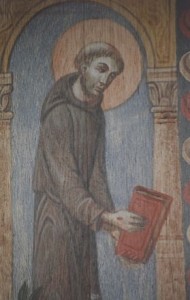
Francis was the son of Peter Bernardone, an Italian merchant. He was a generous, light-hearted man, not at all the son his father had envisioned taking over his cloth business. Francis longed to become a knight. After an experience in battle and subsequent imprisonment, Francis became ill. During this time he had time to reflect and his conversion process began.After recovering, he reached out to the poor and outcasts in society, notably lepers, and shared his material resources generously. He even began to repair churches in Assisi, after hearing the Lord tell him to rebuild the church. His father was outraged at his behavior, and brought him before the bishop of Assisi. Francis returned his father’s material possessions, and professed his love for God the Father alone.
After hearing the Gospel in which Our Lord commissions His apostles to carry no possessions, Francis recognized God’s will in his life and began a radical penitential movement. Others joined him, living in poverty, traveling, and preaching. They called themselves the friars minor, and Pope Innocent III gave approval.
A second order, for women, was established and headed by Saint Clare, and a third order was established for both men and women. Francis showed a great love for all of creation, and is known for his songs and poetry praising God in creation. His love of the crucified Christ filled his heart, and, two years before his death, he received the stigmata (sacred wounds) on his body. Francis died in 1226. His feast day is October 4th.
